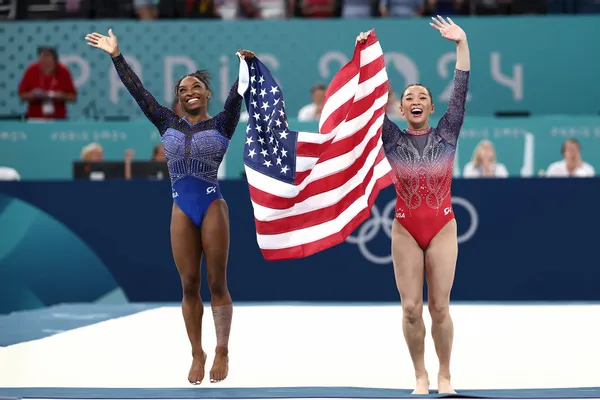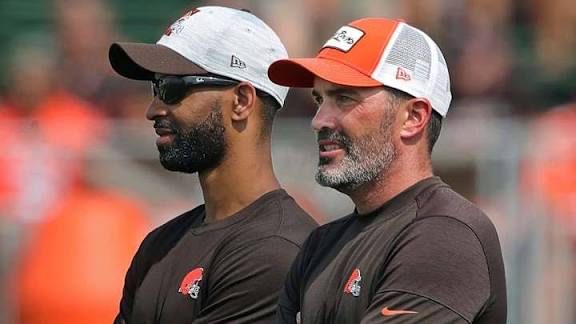Gold medalist Simone Biles (L) and Bronze medalist Sunisa Lee of Team United States celebrate with the American flag after competing in the Artistic Gymnastics Women’s All-Around Final on day six of the Olympic Games Paris 2024 at Bercy Arena on August 01, 2024 in Paris, France. Gold medalist Simone Biles (L) and Bronze medalist Sunisa Lee of Team United States celebrate with the American flag after competing in the Artistic Gymnastics Women’s All-Around Final on day six of the Olympic Games Paris 2024 at Bercy Arena on August 01, 2024 in Paris, France. If the Paris Olympics had a theme, it would be “comeback.” The sense of normalcy after Tokyo’s largely amended agenda in 2021, devoid of fans and laced with stringent pandemic-era restrictions. Celine Dion’s triumphant return to the stage, as she closed out the opening ceremony with a glittering and emotional rendition of Edith Piaf’s “Hymne à l’amour.” Public health and artful performances aside, however, these Olympics marked the culmination of comeback campaigns for some of Team USA’s most prominent athletes.Simone Biles, Sunisa Lee, Sha’Carri Richardson. Two gymnasts and a sprinter, each of whom has held a central role in our domestic success at the Olympics thus far (the U.S. currently leads with the most gold medals won) and in drawing a global audience to their screens. For all that distinguishes them athletically, there’s one commonality that Biles, Lee and Richardson share in earnest — their redemption tour.Before they were Olympians, they were Simone, Sunisa and Sha’Carri.Currently, each of these women is at the height of their physical performance, further cementing themselves as exemplars of their respective sports through their Olympic efforts. But how do we conceptualize them outside of this mold? Before the aerials, the back handsprings, the 100-meter dashes and relay handoffs, these seemingly otherworldly talents are still regular people. And regular people, as anyone can attest, are saddled with issues outside of their professional lives that still directly affect them. We can look then, to this trio’s comeback stories and successes in Paris as a reminder that we should view people holistically, not merely through the lens of their chosen disciplines or what they most excel at. “It was just the right thing to do”: 6 heartwarming examples of sportsmanship at the Paris OlympicsIn Salon’s recent interview for the Netflix documentary, “Simone Biles: Rising,” director Katie Walsh shared that Biles felt it was pivotal to “give people a window into her entire self.”“We all see her on the floor as the G.O.A.T. and the greatest ever. But we all don’t get to see and have the privilege of getting to know Simone, the human being,” Walsh said. “And I know for her, she wants to be looked at and viewed as a full human and not just this amazing gymnast you’ve come to really expect to be perfect at all times.”Given that Biles, who recently became the most decorated American gymnast of all time, is widely regarded as an uncontested talent in the sport, a comeback isn’t necessarily something that fans might have expected of her. What would she have to return to if she’s already at the top?Walsh’s sentiments — and the documentary more broadly — follow a debilitating era in the Biles’ history in gymnastics. After suffering a bout of the “twisties,” a disorienting sensation that unmoored Biles’ body from her mind in Tokyo, she elected to withdraw from the Games. “I have to focus on my mental health,” Biles said at the time, per the BBC. “I don’t trust myself as much anymore.”Evidently, neither did a number of others. Rather than being lauded for her bravery (and numerous medals from the Rio Games in 2016), her decision was widely panned by online critics who scrutinized her “abandonment” of her teammates. Media mudslinging abounded on various social media platforms. Journalist Tim Constantine swiftly authored an op-ed for The Washington Times titled, “Simone Biles is no hero. She is a quitter.” Coupled with her 2021 testimony before the U.S. Senate regarding sexual abuse she and other members of USA Gymnastics endured by former team doctor, Larry Nassar, Biles’ mental health quickly deteriorated. Three years later, Biles has flipped the script on the haters, outperforming even herself with three gold medals — all-around team, all-around individual, and vault — and one silver — for the floor event — to add to her collection. “Being in a good mental spot, seeing my therapist every Thursday is kind of religious for me. So that’s why I’m here today,” the phenom told NBC in a June interview, openly attributing consistent mental care to her sparkling return. Many Americans can and should look to Biles’ embracement of mental health services for inspiration. A 2021 report from the Mental Health Million Project found that 45 percent of individuals in the U.S. suffering from a clinical mental problem do not seek help. While the reasons behind why people forgo treatment are varied and often subjective, America’s cultural dismissal of therapy and general obstinance about prioritizing mental health gives credence to the intense backlash Biles faced post-Tokyo. For Lee, the issues plaguing her physical health found a nexus with her mental state. Her path to the Paris Games was stymied by a diagnosis in 2022. A chronic, incurable kidney disease left her with a litany of adverse symptoms. “It wasn’t something like I can just take a pill and be better; I was going to have to deal with this my whole life,” Lee, who earned a gold medal in the individual all-around in Tokyo, told the New York Times in an interview published last month.While Lee hasn’t publicly shared the specifics of her condition “because it may change as her medical team learns more about her illness,” as noted by TODAY, abnormal swelling, hot flashes, cold spells and headaches forced her to modify her training and begin intensive physical therapy. It was an ironic situation in the fullest sense — her physical prowess, what her worth had hinged upon as far as society was concerned, was at bitter odds with her body.“I was like, who is this person looking back at me?” Lee told The Times. “It was so scary. I didn’t know it then, but the old Suni was gone. And she would never be back.”Sunisa LeeSunisa Lee of Team United States on Balance Beam competes during the women’s Artistic Gymnastics All-Around Final on day six of the Olympic Games Paris 2024 at Bercy Arena on August 01, 2024 in Paris, France. Champions are made, not by pandering to the noise, but by believing in the fullest version of oneself.Lee’s case is only one instance of how invisible illnesses remain an unaddressed issue in athletics; oftentimes, interest and sympathy are only assigned to ailments that can be perceived outwardly. In a 2023 column for Slate, Fortesa Latifi writes, “Chronic illness forces you to make a choice: look at your body differently, as something that is imperfect, or spend your entire life mourning what has been left behind in the land of health. For chronically ill athletes, it can be a tightrope walk to figure out how to push their bodies while respecting the limits of their diseases.” Oftentimes, there’s a chasmic dissonance between the urge to fulfill societal expectations of the quintessential athlete and what can actually be accomplished while one’s health flounders. As a longtime competitive runner and chronically ill person, this is an experience I can speak to directly.Lee however remained undeterred by her illness and summoned the gumption and self-confidence to return to the mat after a brief hiatus, brushing aside the narrowly construed frameworks of athleticism. “This comeback was so much more than my return to elite gymnastics,” she wrote in a 2023 Instagram post. “It was me proving to myself that I can overcome hard things, and to hopefully inspire others to never let life’s setbacks stop you from going after your dreams.”“My doctor was telling me he didn’t think I’d be able to do gymnastics ever again,” Lee shared with TODAY. “So to even be here is an accomplishment in itself. And I’m super proud of myself.”


